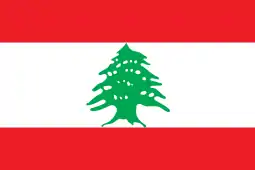National Anthem of Lebanon
The Lebanese National Anthem (Arabic: النشيد الوطني اللبناني, an-Našīd al-Waṭanī al-Lubnānī) was written by Rašid Nakhla and composed by Wadia Sabra. It was adopted on 12 July 1927, seven years after the proclamation of the state of Greater Lebanon during the French mandate.
| النشيد الوطني اللبناني | |
 | |
National anthem of | |
| Lyrics | Rašid Naxla |
|---|---|
| Music | Wadia Sabra, 1925 |
| Adopted | 12 July 1927 |
| Audio sample | |
Lebanese National Anthem (instrumental)
| |
History
The Lebanese national anthem was chosen following an open nationwide competition. The result of the contest was published in newspapers.
Composition
The music of the national anthem is influenced by Beirut's exposure to western culture by the end of the 19th century. It was composed by French trained artist Wadia Sabra in 1925.[1]
Lyrics
Arabic |
Romanization (EALL) |
Phonemic transcription (IPA) |
كلنا للوطن للعلى للعلم |
Kullunā li-l-waṭan, li-l-ʿulā li-l-ʿalam |
/kulːunaː li lwatˤan | li lʕulaː li lʕalam/ /milʔu ʕajn izːaman | sajfunaː wa lqalam/ /sahlunaː wa l(d)ʒabal | manbitun li rːi(d)ʒaːl/ /qawlunaː wa lʕamal fiː sabiːlil kamal/ /kulːunaː li lwatˤan/ /ʔusdu ɣaːbin mataː | saːwaratnaː lfitan/ /ʃarqunaː qalbuhu | ʔabadan lubnaːn/ /sˤaːnahu rabːuhu | li madaː lʔazmaːn/ /kulːunaː li lwatˤan/ /rifduhu birːuhu | maːliʔu lqutˤbajn/ /ʔismuhu ʕizːuhu | munðu kaːna l(d)ʒuduːd/ /ma(d)ʒduhu ʔarzuhu | ramzuhu li lxuluːd/ /kulːunaː li lwatˤan/[3][lower-alpha 1] |
Translations
| French | English |
|---|---|
Tous pour la patrie, pour la gloire et le drapeau. |
All of us! For our Country, for our Glory and Flag! |
Notes
- The anthem is usually sung using the MSA pronunciation instead of Lebanese Arabic.
References
- Zuhur, Sherifa (2001). Colors of enchantment: theater, dance, music, and the visual arts of the Middle East (illustrated ed.). Cairo: American university in Cairo press. p. 456. ISBN 9789774246074. Retrieved 8 October 2009.
- "The National Anthem". The Embassy of Lebanon. Retrieved 23 August 2019.
- Transcriptions are based primarily on reliable sources from articles Arabic phonology, Arabic language and Help:IPA/Arabic. Therefore, it is not considered original research.
- Wissam, Tarhini. "L'hymne national du Liban". Ministère libanais de l'Information (in French). Retrieved 23 August 2019.
- Farshad, Mohammad-Avvali (2007). The Role of Art in the Struggle for National Identity in Lebanon. Akademische Schriftenreihe. GRIN Verlag. p. 36. ISBN 9783638778602. Retrieved 8 October 2009.
- Goldstein, Margaret J. (2004). Lebanon in Pictures. Visual geography series (illustrated, revised ed.). Twenty-First Century Books. p. 80. ISBN 9780822511717. Retrieved 8 October 2009.
External links
- The National Anthem – A page that is part of the official page of the Presidency of Lebanon.
- The Hymns of the Army page at the official website of the Lebanese Army.
- Lebanese national anthem